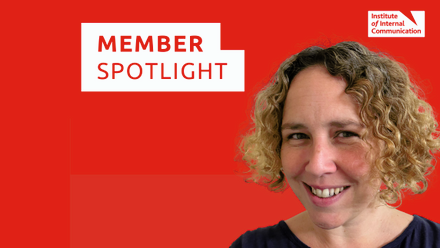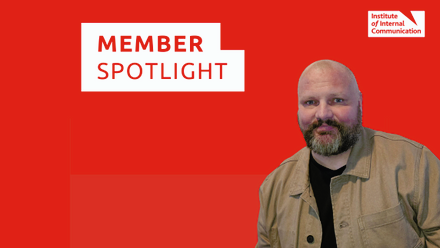You'd know it as Santander; back then it was Abbey National.I started in my local branch for a couple of years, before getting my foot in the door at the nearby head office in Milton Keynes by literally applying for every role I thought I could do. It's not a career-tactic I would necessarily recommend but, when I look back now, I have much admiration for that 19-year old who knew what she wanted (to work in a big office, brimming with opportunities) and didn't care how many rejection letters she'd have to go through before she got it.
Even all these years later, I remember reading the role profile for the IC job (I had no idea what IC was) and thinking, this sounds amazing!It appealed to things I knew I liked (creativity and writing) and even the bits I didn't fully understand sounded exciting so me.I also remember starting my personal statement with 'I was born to talk'!Totally cringe-worthy, I know!But reflecting back I also find it interesting that I thought it was all about talking.The truth is quite the opposite.
Fast forward 19 years (yes, I did start in internal communications before email was in widespread use – can you imagine that?) and I'm thinking about all of the elements in an internal communications role that I hugely value so I can share them with you…
Listening is one of the most important skills you will develop in internal communications – both listening to what's being said and, just as significant, what's not being said. Over time, you learn to hone in on the significant words and help spread them around. Listening is a great skill to have and one that will help you out in all areas of your life. Oh, and it's learnable, so don't worry if it's not in your 'toolbox' right now.
You're always in the thick of it. If you're someone that always likes to know what's going on and gets excited about what's new and changing, then there's hardly a better place to be than in the internal communications team. Let's face it, the organisation trusts us with most of their secrets and seeks our advice on when to whisper them, when to shout them from the roof tops and when to say nothing at all. It's a position of privilege, but more importantly than that to me, it means there is never a dull day. If there's stuff going on, you're likely be part of it.We get to be on the frontier of all the new technological and digital development, often being guinea pigs, so we can test things out before helping to tell colleagues about them.
Plan for the unexpected.I'll put this out there now and be honest. If you're not good at planning, internal comms might not be the job for you. Not only do we find ourselves planning for what's going to happen, we often find ourselves planning for what might not happen. And boy, do those plans move around - usually at the whim of a senior colleague who is a bit late to the 'commenting party'! Find me a comms professional who says their plans never change and I'll be expecting them to be glowing and wearing wings and a halo because we must have entered heaven.
It's all about people. Even working from home, alone, in a world plagued by Coronavirus, I must speak to at least 20 different people on average, every working day. And when I say different, I mean from all parts of our business (and sometimes, due to the fact I now work for global travel company, TUI) from all parts of the world.So much of what we do is about quickly building working relationships with anyone that needs our help, so that you know how to give them advice and feedback and you can gain their trust quickly to show that you're the right person to help them.I used to think this was easy for me because I've an extroverted personality type, but I have teammates who are classic introverts and they also excel. The trick is to be curious about what everyone has to say and ask lots of questions… another great skill for all parts of your life.
You get to channel your inner Luke Skywalker.Ok, so maybe I'm getting a bit carried away but there is a lot of truth to the fact that you will wield a virtual 'noisesaber' (in place of Luke's lightsaber) to 'defend' your colleagues from an onslaught of noise.In a world where we are bombarded with news and information from all angles, particularly with our beloved social media, your role is to help the people in your organisation navigate through the chaos, to seek what's relevant and interesting for them and what they need for their jobs. You become a custodian of the messages that really matter.Wow, how cool does this job sound?!
These are just five of elements that make internal comms the challenging but rewarding role that mean I never get that 'oh no, it's Monday tomorrow' moment.And there's a whole heap more beside. But if anything in here appeals to you, I would strongly encourage you to look more closely to see if internal communications could be a career choice for you.
Ps. If you've done the maths, you'll have worked out that I made the very personal choice not to go to university after I finished my A-levels. To this day, I'm happy with that decision – it was right for me and I don't think it's ever held me back.






